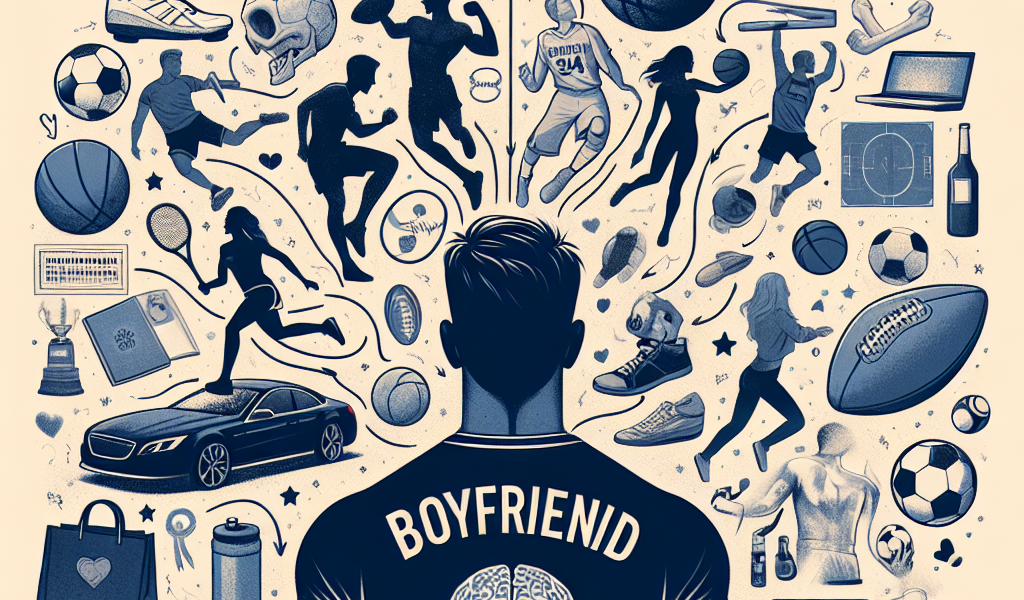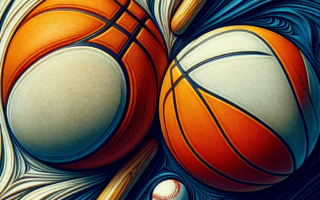Have you ever wondered why your boyfriend has an intense passion for sports? It’s something that may have perplexed you, leaving you with questions about his unwavering loyalty to his favorite teams and players. In this article, we will explore the reasons why your boyfriend is so infatuated with sports, uncovering the deep-rooted emotions and connections that make it more than just a game for him. Get ready to gain a better understanding of this aspect of his life that he holds dear to his heart.

The Psychology of Sports
Sports have a profound impact on individuals, not only from a physical standpoint but also from a psychological perspective. The emotional and mental connections that people form with sports are multifaceted and can be attributed to various factors. Understanding the psychological aspects of sports can shed light on why they hold such a significant place in our lives.
The role of competition
Competition is an inherent part of human nature, and sports provide a platform where individuals can channel their competitive drive. The desire to outperform others and strive for victory taps into our primal instincts, triggering a surge of adrenaline and excitement. Competition in sports fuels our sense of accomplishment and pushes us to reach new heights of achievement.
The appeal of teamwork
While competition drives individual performance, the appeal of teamwork lies in the camaraderie and unity it fosters. Being part of a team allows individuals to experience a sense of belonging and purpose. The collaboration and support among teammates create strong bonds and instill a feeling of collective achievement. The shared goals and coordinated efforts in team sports contribute to a deep sense of camaraderie and belonging.
The thrill of victory
The taste of victory in sports is unparalleled. Winning provides an immediate rush of joy, satisfaction, and pride. The sense of achievement that accompanies a victory reinforces self-confidence and boosts self-esteem. The thrill of victory is a powerful motivator, encouraging individuals to persevere and excel in their respective sports.
The agony of defeat
On the flip side, the agony of defeat can be equally profound. Losing in sports can be emotionally challenging, as it often reflects a failure to meet personal or team expectations. The disappointment and anguish experienced after a defeat can motivate individuals to introspect, learn from their mistakes, and strive for improvement. The agony of defeat teaches resilience, humility, and the importance of perseverance.
The sense of identity and belonging
Sports provide individuals with a sense of identity and belonging, allowing them to align themselves with a particular team or sport. Supporting a team or engaging in a sport becomes an essential part of their identity, shaping their social interactions and personal relationships. The shared experiences and common values cultivated through sports create a sense of belonging to a larger community, enhancing a person’s social connectedness.
Escape from Daily Life
In the fast-paced and often stressful world we live in, sports offer a much-needed escape from reality. They provide a break from the monotony of everyday life and offer a range of benefits for mental well-being.
Sports as a form of entertainment
One of the primary reasons people engage with sports is their entertainment value. Watching a match, game, or race can be an exhilarating experience that captivates and engages spectators. The unpredictability of sports, the skillful maneuvers, and the excitement of close matches provide a form of entertainment that allows individuals to relax and enjoy the moment. Sports give us a break from our routine and offer a welcome respite from the demands of daily life.
The distraction from stress
Engaging in or watching sports can provide a temporary distraction from the stressors of life. When immersed in a game, one’s attention is redirected, momentarily easing worries and anxieties. By focusing on the sport at hand, individuals can experience a mental reprieve and find solace in the present moment. The temporary escape from stress that sports offer allows individuals to recharge and rejuvenate, promoting overall well-being.
The opportunity for escapism
Sports provide a realm of escapism, a realm where individuals can immerse themselves in the world of their favorite teams or athletes. By stepping outside their own reality and entering the realm of sports, individuals can temporarily disconnect from their own concerns and live vicariously through the sporting events they engage with. This opportunity to escape the pressures and responsibilities of daily life can be both comforting and liberating.
The release of tension
Physical activity and exercise are well-known for their stress-reducing benefits, and sports offer a similar outlet. Engaging in sports allows individuals to release pent-up tension and aggression in a controlled and productive manner. The physical exertion involved in playing or even watching sports activates the body’s natural mechanisms for stress relief, promoting the release of endorphins and providing a sense of relaxation and contentment.
The creation of a temporary world
Sports create their own microcosms, complete with rules, dynamics, and narratives. When participating in or observing these temporary worlds, individuals can escape the complexities and challenges of their own lives and lose themselves in a different reality. The immersive nature of sports allows individuals to detach from their worries and immerse themselves in a world where their focus is solely on the sport, its intricacies, and the narratives unfolding within it.

Social and Cultural Factors
Sports play a significant role in shaping our social and cultural identities. They provide a platform for socialization, bond individuals together, and contribute to the formation of shared memories and traditions.
Influence of family and friends
The influence of family and friends is often a crucial factor in developing an interest in sports. Growing up, many individuals are introduced to sports by their families, who either actively engage in sports themselves or passionately support particular teams. Friends also play a valuable role in fostering sports-related interests, as shared experiences and discussions about games or matches create a sense of belonging and camaraderie.
Cultural expectations and norms
Sports often reflect the cultural expectations and norms of a society. Different cultures place varying levels of emphasis on certain sports, leading individuals within those cultures to develop preferences and attachments. For example, in some countries, soccer is considered the national sport and holds significant cultural importance, while in others, baseball or cricket may hold a similar status. These cultural expectations and norms influence an individual’s relationship with sports and shape their personal identity.
Socialization through sports
Participating in sports provides opportunities for socialization and interaction with peers. Team sports, in particular, promote social bonding and the development of interpersonal skills. Working together towards a common goal, individuals learn to communicate effectively, resolve conflicts, and build relationships. The socialization that occurs through sports extends beyond the field or court and can lead to lifelong friendships and networks.
The bonding experience
Sports have a unique ability to bring people from diverse backgrounds together. Whether it’s supporting the same team or engaging in friendly banter with rival fans, the shared experience of sports bridges gaps and fosters connections between individuals who may not have otherwise interacted. The bonding experience created by sports promotes social cohesion and strengthens communities.
Shared memories and traditions
Sports create lasting memories and traditions that resonate with individuals throughout their lives. The collective experience of witnessing significant sporting events, celebrating victories, or mourning defeats forms a shared narrative. These shared memories and traditions allow individuals to connect with others on a profound level, as they reflect common experiences, emotions, and values. Sports become a source of nostalgia and a way to reminisce about cherished moments in the company of like-minded individuals.
Emotional Connection
Sports elicit a range of emotions, creating a deep and enduring emotional connection for fans and participants alike.
Reliving childhood memories
Sports often evoke memories of childhood, as many individuals were introduced to sports at a young age. Cheering for a favorite team or participating in a sport can rekindle the innocence, joy, and excitement associated with childhood experiences. The act of reliving these memories fosters a sense of nostalgia and nostalgia and sentimental value sentimentality, contributing to the emotional connection individuals have with sports.
Nostalgia and sentimental value
The sentimental value attached to sports is a powerful emotional driver. The memories associated with attending sporting events with loved ones, the jerseys or memorabilia passed down through generations, and the recollection of past victories all contribute to a sense of nostalgia and emotional attachment. Nostalgia allows individuals to reconnect with positive emotions and create a bridge between their past and present selves.
Inspiration and motivation
Sports have the power to inspire and motivate individuals. Witnessing extraordinary athletic feats or hearing stories of resilience and triumph can ignite a spark within, encouraging individuals to pursue their dreams and overcome obstacles. Athletes, through their actions and achievements, become role models who instill a sense of belief and hope in others. The emotional connection formed through inspiration and motivation fuels passion and dedication towards sports.
Emotional investment in favorite teams
Supporting a favorite team creates a deep emotional investment that transcends mere fandom. The victories and defeats of a beloved team are felt personally, triggering a range of emotions such as elation, disappointment, frustration, and hope. The emotional rollercoaster of supporting a team strengthens the connection between individuals and their chosen team, creating an unwavering loyalty and an enduring bond.
The rollercoaster of emotions
Sports can take individuals on a rollercoaster ride of emotions. The exhilaration of a last-minute goal, the tension of a close match, or the heartbreak of a missed opportunity can evoke intense feelings that resonate long after the game is over. The emotional highs and lows experienced through sports create a sense of vibrancy and passion that make them an integral part of people’s lives.

Physical and Intellectual Stimulation
Sports offer both physical and intellectual stimulation, promoting overall well-being and cognitive development.
The adrenaline rush
Engaging in sports, whether as a participant or a spectator, triggers the release of adrenaline. This hormone generates a surge of energy and excitement, enhancing focus and performance. The adrenaline rush experienced during sports fosters a heightened sense of awareness and intensifies the enjoyment and engagement with the sport.
Enhancing cognitive abilities
Sports require strategic thinking, problem-solving, and decision-making, enhancing cognitive abilities. Analyzing game situations, assessing opponents’ moves, and making split-second decisions on the field or court activate critical thinking skills. This cognitive stimulation sharpens mental acuity, improves focus, and nurtures cognitive flexibility.
Analyzing strategies and tactics
Sports enthusiasts often find themselves captivated by the strategic elements of the game. Analyzing the strategies and tactics employed by teams or athletes fosters intellectual engagement and stimulates the mind. The ability to dissect game plans, identify patterns, and anticipate outcomes cultivates a deeper appreciation for the complexities of sports and fosters intellectual growth.
Learning new skills
Participating in sports provides individuals with opportunities to learn and develop new skills. Whether it’s learning to kick a ball, swing a bat, or dribble a basketball, the process of acquiring and refining skills stimulates the brain’s learning mechanisms. The acquisition of new motor skills enhances coordination, agility, and dexterity, contributing to physical well-being.
Keeping physically active
The physical aspect of sports is well-known and appreciated. Engaging in sports keeps individuals physically active, promoting cardiovascular health, strength, and endurance. Regular physical activity is associated with several health benefits, including reduced risk of chronic diseases, improved mental well-being, and increased overall longevity. The physical stimulation that sports provide plays a vital role in maintaining a healthy lifestyle.
Fantasy Sports and Gambling
Fantasy sports and gambling have become increasingly popular, catering to individuals’ competitive spirit and desire for excitement.
The thrill of competition
Fantasy sports capitalize on the desire for competition, allowing individuals to create their own teams and compete against others. The ability to strategize, make player selections, and manage one’s team taps into the same competitive instincts that fuel traditional sports. The thrill of trying to outscore opponents and claim victory adds an extra layer of excitement and engagement.
The challenge of strategic decision-making
Fantasy sports require participants to make strategic decisions based on real-life player performance. Assessing player statistics, predicting outcomes, and making informed choices stimulate critical thinking and strategic decision-making skills. The challenge of making the right moves creates a sense of intellectual engagement and satisfaction when those decisions yield positive results.
The potential for financial rewards
Gambling in sports adds an extra layer of excitement and anticipation. Placing bets on the outcome of games or specific events within a match activates the thrill of chance and possibility. The potential for financial rewards heightens the entertainment value of sports, attracting individuals who seek the adrenaline rush associated with taking risks.
The social aspect of fantasy leagues
Participating in fantasy leagues fosters social interaction and friendly competition. Engaging in discussions and debates with fellow participants, trading players, and analyzing team performances strengthens social connections. Fantasy leagues create a community of sports enthusiasts who bond over their shared passion, forming networks and relationships that extend beyond the realm of fantasy sports.
The personal investment in player performance
Fantasy sports and gambling deepen the personal investment individuals have in players and teams. Analyzing player statistics, following their career trajectories, and relying on their performance for personal success create a unique bond between participants and individual athletes. This personal investment intensifies emotional connections and enhances the overall sports experience.

Celebrity Culture and Media Influence
Sports and the accompanying media coverage have given rise to a celebrity culture that has a profound impact on individuals’ fascination with athletes.
Idolizing sports figures
Sports figures often become idols, admired and revered by fans. Their exceptional skills, remarkable achievements, and charismatic personalities make them aspirational figures. Fans develop emotional connections with their favorite athletes, idolizing them and drawing inspiration from their success. The idolization of sports figures contributes to the sense of admiration, loyalty, and passion that fans feel for their chosen sport.
Media coverage and influence
Media coverage plays a significant role in shaping the perception and influence of sports. Sports events receive extensive coverage through various media channels, providing real-time updates, in-depth analysis, and personal narratives. Media coverage fuels fan engagement, generating discussion, and facilitating a greater understanding of the sport. The influence of media in sports extends beyond the game itself, shaping public opinion, highlighting athletes’ stories, and fostering a connection between fans and their favorite sports.
The pressure of celebrity status
The status of athletes as celebrities places them under immense pressure. The spotlight magnifies their every move, on and off the field, subjecting them to scrutiny and high expectations. Athletes must navigate the pressures of maintaining their performance, handling media attention, and fulfilling the image they project. The pressure of celebrity status not only affects athletes but also adds to the intrigue and fascination fans have with the world of sports.
The influence of endorsements
Endorsements by athletes have a significant impact on consumer behavior and brand loyalty. Fans often associate their favorite athletes with the products they endorse, perceiving them as reliable and trustworthy. The influence of endorsements extends beyond traditional marketing, as fans aspire to emulate their favorite athletes’ choices and lifestyles. This association between athletes and products reinforces the emotional connection individuals have with sports figures.
The glamorous lifestyle
The perceived glamorous lifestyle of athletes adds to their allure. The wealth, fame, and adoration that come with professional sports create an image of a glamorous existence. From extravagant parties to luxurious homes, athletes are often portrayed as living a life of opulence and luxury. This glamorization enhances the fascination individuals have with the world of sports and contributes to the emotional connection they form with sports figures.
A Sense of Belonging and Identity
Sports provide individuals with a sense of belonging and allow them to define a part of their identity through their support for teams or participation in sports.
Identification with a favorite team
Many individuals feel a deep sense of identification with a particular sports team. Supporting a team becomes part of their identity, influencing their social interactions and personal relationships. The team’s successes and failures are felt personally, creating a shared bond with fellow supporters. This identification with a favorite team strengthens the sense of belonging and reinforces an individual’s connection to their chosen sport.
The feeling of being part of a larger community
Engaging in sports creates a feeling of being part of a larger community. Whether it’s attending matches or participating in sports events, the shared experience of coming together for a common purpose fosters a sense of belonging. Being surrounded by like-minded individuals who share a passion for sports promotes a sense of connection and community, making individuals feel valued and understood.
The validation of shared values
Supporting a sports team often extends beyond mere fandom and becomes a reflection of an individual’s values. The ethos, principles, and character associated with a team resonate with fans who share similar beliefs. This validation of shared values, be it a commitment to teamwork, perseverance, or fair play, reinforces a sense of identity and belonging. Supporting a team aligned with one’s values provides individuals with a source of validation and affirmation.
The expression of loyalty and passion
Expressing loyalty and passion towards a team is a way for individuals to showcase a fundamental aspect of their identity. Sports fandom is characterized by unwavering support, vocal enthusiasm, and a deep emotional investment. By outwardly expressing their loyalty and passion, individuals communicate an essential part of who they are, cementing their identity within the world of sports.
Creating a personal identity through sports
Sports offer individuals the opportunity to create a personal identity that is closely tied to their participation in or support for a sport. Whether through personal achievements as an athlete or the unwavering support for a favorite team, sports provide avenues for self-expression and self-identification. The emotional connections formed through sports become an integral part of an individual’s identity, influencing their values, aspirations, and sense of purpose.

Historical and Cultural Significance
Sports hold significant historical and cultural importance, often reflecting societal values, preserving traditions, and fostering a sense of pride and patriotism.
Sports as a reflection of society
Sports mirror the values, norms, and ideals of society at a particular point in history. Sporting events provide an arena where societal issues are magnified and where social progress is both celebrated and challenged. By examining the history and evolution of sports, we gain insights into the broader shifts in societal attitudes, gender dynamics, and cultural acceptance.
The impact of historic events on sports
Historic events often have a profound impact on sports. From the Olympic Games held during times of conflict to the breaking of racial barriers in professional sports, these moments forever imprint themselves on the sports landscape. Sports serve as a testament to human resilience, highlighting the ability to transcend adversity and find unity in the face of hardship.
Preserving traditions and legacies
Sports traditions and legacies are treasured and passed down through generations. The rituals, celebrations, and iconic venues associated with sports create a sense of continuity and heritage. Preserving traditions allows individuals to connect to their cultural roots, fostering a sense of pride and connection. The passing down of sports-related customs and stories ensures that the legacies of legendary athletes and teams remain alive.
The sense of pride and patriotism
Sports have the power to unite a nation and evoke a deep sense of pride and patriotism. International sporting events, such as the Olympic Games or the World Cup, become platforms for representing one’s country on a global scale. The achievements and successes of national teams or athletes generate a collective sense of pride and serve as a source of national identity. Sports become a reflection of shared values and aspirations, generating a sense of patriotism and cultural unity.
Sports as a unifying force
Sports have the capacity to bridge divides and bring people together. In moments of sporting triumph or crisis, societal differences are momentarily set aside as people rally around a common cause. Whether it’s cheering for the same team, participating in sports events together, or engaging in friendly competition, the unifying force of sports promotes a sense of shared humanity and fosters social cohesion.
Sense of Purpose and Achievement
Engaging in sports provides individuals with a sense of purpose, motivating them to pursue personal goals, strive for excellence, and derive a deep sense of achievement.
Pursuing personal goals and dreams
Sports allow individuals to set personal goals and dedicate themselves to their pursuit. Whether aspiring to compete at the highest level, improve personal performance, or overcome challenges, the drive to achieve personal goals gives individuals a sense of purpose and a direction to channel their passion. Sports become a pathway for self-discovery and personal growth.
The motivation to excel
The competitive nature of sports fuels the motivation to excel. The desire to be the best version of oneself, to surpass previous achievements, and to continually improve drives athletes and enthusiasts alike. The pursuit of excellence in sports requires discipline, sacrifice, and resilience, with each milestone reached providing a renewed sense of purpose and motivation.
The satisfaction of progress and improvement
Sports provide tangible markers of progress and improvement, offering individuals a sense of satisfaction and fulfillment. Witnessing personal growth in terms of skill level, physical performance, or tactical understanding serves as confirmation that efforts are yielding results. The satisfaction of progress and improvement reinforces the sense of achievement and motivates individuals to continue pushing their boundaries.
The pursuit of greatness
Sports often serve as a platform for individuals to pursue greatness and leave a lasting legacy. Whether it’s through record-breaking achievements, becoming an iconic figure in a sport, or making a significant impact on the sporting world, the pursuit of greatness propels individuals to push their limits and strive for remarkable success. The aspiration for greatness serves as a driving force and elevates the sense of purpose and accomplishment gained from engaging in sports.
The feeling of accomplishment
The culmination of hard work, dedication, and perseverance in sports results in a tremendous feeling of accomplishment. Whether achieving personal goals, winning championships, or surpassing one’s own expectations, the sense of accomplishment obtained through sports is unparalleled. This feeling of accomplishment transcends individual achievements, as it encompasses the knowledge that one’s efforts have made a lasting impact within the sporting realm.
As we delve into the psychology of sports, it becomes increasingly clear why so many people, including your boyfriend, love sports so much. From the inherent human desire for competition and the opportunities for escapism to the emotional connections formed and the physical and intellectual stimulation experienced, sports provide an array of benefits that enrich our lives. Additionally, the influence of family, cultural factors, and the media, as well as the sense of belonging, pride, and achievement attached to sports, help explain the profound impact they have on our identities and society as a whole. So, the next time you wonder why your boyfriend’s love for sports runs so deep, remember the multitude of reasons that make sports a fascinating and captivating part of our lives.






